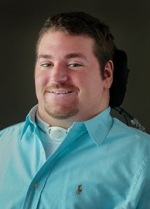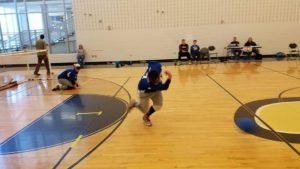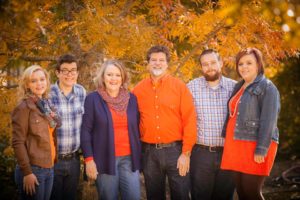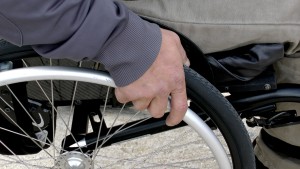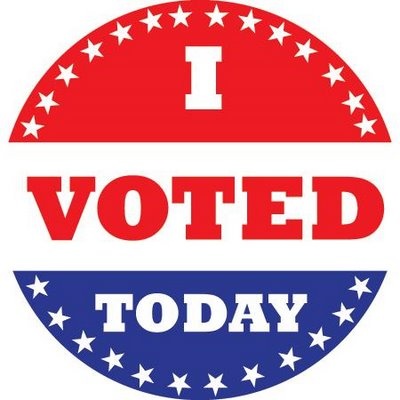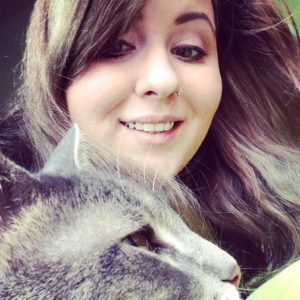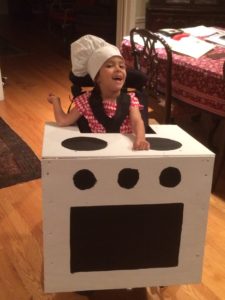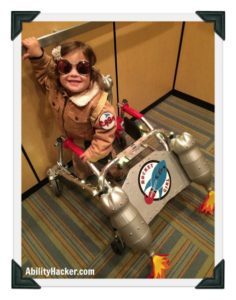Disability and Dating: How to Find Love While Being True to Yourself
Erin is the Digital Content Producer for Easterseals Thrive, an online support network and community hub for disabled women. You can follow Thrive on Instagram, Twitter, and Facebook!
By: Erin Hawley
Finding a partner can be difficult for anyone, but for disabled people, there are extra barriers in place. Many believe the biggest barriers stem from society’s often-skewed views of our capabilities and what it means to be disabled. The stereotype is one of loneliness; we don’t even have friends, except when an abled person takes us under their wing as a charity case. Many are shocked to learn that we have active social lives and romantic relationships, including sexual ones – gasp!
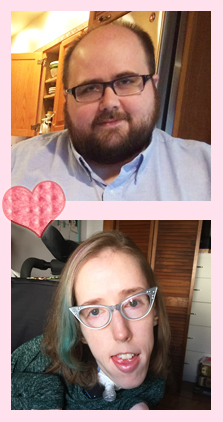
Erin and her partner
There are limited resources for disabled people when it comes to dating and relationships, including sexual and reproductive health. While all disabilities are unique, we also have a common understanding of what it’s like to navigate the world as a disabled person. To me, it’s glaringly problematic that supports for us are absent, or buried under paperwork and abandoned websites.
The unfortunate result of this, of people automatically putting you in the “undateable” category because of your bodily difference, is that you may start believing it yourself. If you’re like me, you might begin to internalize the negative expectations that some doctors, teachers, parents, and others project onto you. I’m not going to lie – undoing that internalized ableism and recognizing your own ability to find love is difficult; but for me, that confidence was necessary.
Finding someone who doesn’t instantly write you off is like searching for the Holy Grail. Even on dating sites geared specifically toward disabled people, that baggage from always being told we were less than our abled peers clouds our relationships with each other. That baggage is so heavy that it even follows you long after you enter a relationship.
But I took charge of my love life. I recognized those negative thoughts that told me no one would find me desirable; I let them pass through me, and pressed on steadfastly. I made dating profiles, I chatted with tons of guys – many who fell off the face of the earth when they realized the extent of my disability. I wasn’t a model who just happened to sit down a lot. I need specific medical care, help with bathroom stuff, assistance dressing, eating, and keeping my airway open. I sit sideways from scoliosis and have frequent back pain. My limbs are contracted, so I have limited range of motion.
People found me physically attractive all the time (I am gorgeous and photograph damn well), but they didn’t want to “deal” with the other stuff. I could write a book about all the creepy, negative e-mails I’ve received while dating – everything from first messages of “hi, can you have sex?” or “will you let me take care of you?” to “Sorry, I’m not interested. You should go on a dating site for your kind.” If you are disabled and just venturing into the online dating world, expect this – a lot. Or expect a low response rate; honestly, I prefer that to the skeevy messages.
 At this point, you may be wondering how I found my partner, since I’ve painted online dating as a barren hellscape. The truth is, they found me when I wasn’t looking. After two failed, long-term relationships and a slew of terrible dates following, I was ready for a break. I needed to find my inner peace I knew was there, that I owned. I hated that my relationships held such power over me, emotionally; so I made an effort to stop searching and focus on my mental health and self care.
At this point, you may be wondering how I found my partner, since I’ve painted online dating as a barren hellscape. The truth is, they found me when I wasn’t looking. After two failed, long-term relationships and a slew of terrible dates following, I was ready for a break. I needed to find my inner peace I knew was there, that I owned. I hated that my relationships held such power over me, emotionally; so I made an effort to stop searching and focus on my mental health and self care.
One lazy afternoon, someone from a dating site sent me a message after recognizing me in a Twitter chat about tabletop gaming. Two weeks go by, and we have our first date. Fast-forward almost four years later, and we are in a healthy relationship based on mutual respect, honesty, support, and understanding. My disability is an integral part of my identity, and they accept and love that about me, as I accept and love them.
Dating is treacherous. It makes you feel vulnerable, and constantly tests your inner strength. You will get your heart broken in ways you never thought possible (or you could be the luckiest person ever – in which case, rock on). Remember to love yourself first, as best you can, because that love is something they can’t take away from you. And if you ever feel like no one would want to date you because of your disabilities, silence that beast – it’s lying.







